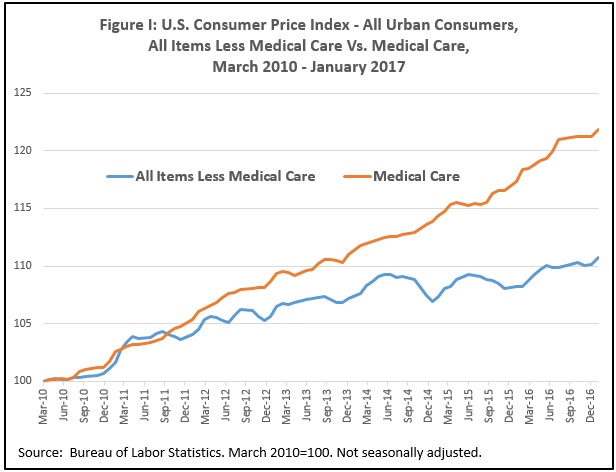Health Prices Up Two Thirds Less Than CPI
 The Consumer Price Index rose 0.6 percent in December, while medical prices rose only 0.2 percent. This is the fifth month in a row we have enjoyed medical price relief in the CPI. Even prices of prescription drugs rose by only 0.3 percent. Prices of three components – medical equipment and supplies, dental services, and care of invalids and elderly at home even dropped. No category rose more than 0.1 percentage point more than all item CPI. Medical price inflation contributed only three percent of CPI for all items.
The Consumer Price Index rose 0.6 percent in December, while medical prices rose only 0.2 percent. This is the fifth month in a row we have enjoyed medical price relief in the CPI. Even prices of prescription drugs rose by only 0.3 percent. Prices of three components – medical equipment and supplies, dental services, and care of invalids and elderly at home even dropped. No category rose more than 0.1 percentage point more than all item CPI. Medical price inflation contributed only three percent of CPI for all items.
Over the last 12 months, however, medical prices have increased much more than non-medical prices: 3.9 percent versus 2.4 percent. Price changes for medical care contributed 13 percent of the overall increase in CPI.
See Figure I and Table I below the fold:
Many observers of medical prices decline to differentiate between nominal and real inflation. Because CPI is has been low until recently, even relatively moderate nominal price hikes for medical care are actually substantial real price hikes. More than six years after the Affordable Care Act was passed, consumers have not seen relief from high medical prices, which have increased over twice as much as the CPI less medical care since March 2010, the month President Obama signed the law.
We can only hope the last five months have established a new trend that will improve even more once Obamacare is repealed and replaced with a reform that allows more price competition.
Technical Note: Professor Christopher Conover explains why some scholars de-emphasize CPI and medical CPI as appropriate measures of inflation for health care, preferring another dataset, Personal Consumption Expenditures (PCE). There are very good reasons for such a conclusion. However, CPI comes out monthly. The PCE price index is updated only quarterly, and that is only for services. Prices for goods, such as drugs and medical devices, are updated only annually. Plus, consumers only really care about price increases they experience directly, not price increases borne by other economic actors.




Without a measure of both . HEALTH . AND healthcare utilization rates, the pricing is meaningless. Of course, you realize, a meaningful and widely accepted definition of HEALTH also does not exist. The best we have is a physician’s assessment concisely stated as “I know it when I see it.” This is made even worse by the fact that a concise and verifiable means to define its level of stability also does not exist.
.
Hint: we need to move away from the time domain to the frequency domain for the testing circumstances involved with biologic control system stability. The testing processes for control system stability are long standing traditions within the electrical engineering community. Since biologic systems tend to be non-linear, these testing processes need careful design for their testing parameters.
.
With a bit of sarcasm, anthropologist Ashley Montagu said “Man is the only 150 pound (70 kg.) nonlinear servomechanism (control system) that can can be wholly reproduced by unskilled labor.” It represents his occasionally narrow view of humanity that is balanced by another quotation: “I want to die young at a ripe old age.” So be it, for us all.
Paul, you want NATIONAL HEALTH and you insist, “1. High deductible Plans: limited to individuals with a high level of disposable income for individual and employer group policies.” Why do you get to limit anything?
Why should American parents let some uninformed Nebraska employer, like you, choose the insurance on their children?
Then you write about how docs don’t take medicaid, “Doctors have a very good reason to say this. This is also due to low reimbursement which (1) the ACA starts to improve and (2) we could absolutely improve if we wanted to by allocating more to Medicaid, which is a cheap form of insurance.”
Paul thinks medicaid is cheap, ha ha
https://nationalhealthusa.net/
In Iowa we have a saying – Move the western counties of Iowa into Nebraska and you will double up the IQ of both states. That is Sarpy and Douglas, right Paul?
Paul, this in a free market think tank and socialists are welcome here but, everywhere else you speak much more clearly than here, why is that?
Ron,
you cant double the IQ buy doing that you cut it in half! simple math the more Iowa people the more diluted the entelligence 🙂
Paul is from Omaha? give me a call sometime Paul ill let you buy lunch while we solve some world problems.
Lee, you are brainwashed like my daughter. She went to Omaha schools and UN. But she was born in Iowa and won’t admit it because of her Nebraska brainwashing.
Her IQ is high but now she is in Portland crying that Hillary lost.
I’ll copy what was said on my Trumpcare section for healthcare reform for the first of 4 different types of plans:
.
“1. High deductible Plans: limited to indifiduals with a high level disposable income for individual and employer group policies [ Comment: any Medicare or Medicare Railroad coverage would be secondary.]”
.
hope that clears my overall intent!
Paul, that is goofy, sorry. You want your so-called poor “indifiduals” to pay extra to lower their deductible. That is not smart.
Why do you want poor people to pay extra for insurance?
You shouldn’t comment on insurance and things you don’t understand Paul.